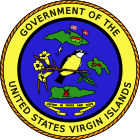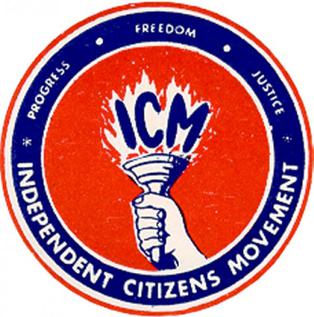 |
|---|
This article lists political parties in the United States Virgin Islands. The United States Virgin Islands has a three-party system, and many additional candidates run as independents.
 |
|---|
This article lists political parties in the United States Virgin Islands. The United States Virgin Islands has a three-party system, and many additional candidates run as independents.
| Party | Ideology | Year founded | Membership (June 2024), trend [1] | 2022 gubernatorial vote | Territorial executive offices | Territorial legislative seats | ||
|---|---|---|---|---|---|---|---|---|
 | Democratic Party | Modern liberalism | 1948 | 12,157 (1st) (56.14%) | 2 / 2 | 11 / 15 | ||
 | Republican Party | Conservatism | 1948 | No candidate | 0 / 2 | 0 / 15 | ||
| Independent Citizens Movement | Reformism | 1968 | 740 (3rd) (3.42%) | 0 / 2 | 0 / 15 | |||
| Party | Ideology | Year founded | ||
|---|---|---|---|---|
 | Green Party | Green politics | – | |
| Party | Notes | Years active | |
|---|---|---|---|
| People's Party | Supported Puerto Rican immigrant interests. [2] | 1950s | |
| Progressive Guide | Supported progressive causes such as social welfare. [2] | 1937–1952 | |
| United People's Party | Formed in 1974 out of the United Caribbean Association of Black People and the Black Power movement. Anti-colonial in nature. [2] | c. 1974 | |
| Unity Party Unity-Democratic | Ideological splinter of the Democratic party out of the Progressive Guide. Dominated island politics in the 50s and successfully took over the Democratic Party by means of fraud in 1962. [2] | 1952–1962 | |

The British Virgin Islands (BVI), officially the Virgin Islands, are a British Overseas Territory in the Caribbean, to the east of Puerto Rico and the US Virgin Islands and north-west of Anguilla. The islands are geographically part of the Virgin Islands archipelago and are located in the Leeward Islands of the Lesser Antilles and part of the West Indies.

The United States Virgin Islands, officially the Virgin Islands of the United States, are a group of Caribbean islands and an unincorporated and organized territory of the United States. The islands are geographically part of the Virgin Islands archipelago and are located in the Leeward Islands of the Lesser Antilles.

Politics of the United States Virgin Islands takes place in a framework of a presidential representative democratic dependency, whereby the Governor is the head of the territory's government, and of a multi-party system. United States Virgin Islands are an unincorporated and organized territory of the United States, administered by the Office of Insular Affairs of the United States Department of the Interior. Executive power is exercised by the local government of the Virgin Islands. The judiciary is independent of the executive and the legislature.

The Virgin Islands are an archipelago in the Caribbean Sea. They are geologically and biogeographically the easternmost part of the Greater Antilles, While the British Virgin Islands are officially designated as “The Virgin Islands”, the name is most often used to refer to the entire international grouping of the British and United States Virgin Islands together with the Spanish Virgin Islands, which, contrary to their name are in fact officially part of the Commonwealth of Puerto Rico, itself an unincorporated territory of the United States. Geographically, the northern islands lie along the Puerto Rico Trench. St. Croix is a displaced part of that same geologic structure. Politically, the British Virgin Islands have been governed as the western island group of the Leeward Islands, which are the northern part of the Lesser Antilles, and form the border between the Caribbean Sea and the Atlantic Ocean. The archipelago is separated from the true Lesser Antilles by the Anegada Passage and from the main island of Puerto Rico by the Virgin Passage.

Saint Thomas is one of the Virgin Islands in the Caribbean Sea, and a constituent district of the United States Virgin Islands (USVI), an unincorporated territory of the United States. Along with surrounding minor islands, it is one of three county-equivalents in the USVI. Together with Saint John, it forms one of the districts of the USVI. The territorial capital and port of Charlotte Amalie is located on the island.

Territories of the United States are sub-national administrative divisions overseen by the federal government of the United States. The various American territories differ from the U.S. states and Indian reservations as they are not sovereign entities. In contrast, each state has a sovereignty separate from that of the federal government and each federally recognized Native American tribe possesses limited tribal sovereignty as a "dependent sovereign nation". Territories are classified by incorporation and whether they have an "organized" government through an organic act passed by the Congress. American territories are under American sovereignty and, consequently, may be treated as part of the United States proper in some ways and not others. Unincorporated territories in particular are not considered to be integral parts of the United States, and the Constitution of the United States applies only partially in those territories.
The National Governors Association (NGA) is an American political organization founded in 1908. The association's members are the governors of the 55 states, territories and commonwealths. Members come from across the political spectrum. NGA declares itself as nonpartisan.

Elections in the U.S. Virgin Islands are held to elect senators to the Legislature of the U.S. Virgin Islands, the governor and lieutenant governor of the territory, and a delegate to the United States House of Representatives.

The Democratic Party of the Virgin Islands is a political party in the U.S. Virgin Islands, and is affiliated with the Democratic Party at the nationwide level. It won the gubernatorial election of 2022 when the incumbent Democratic governor Albert Bryan was elected with 56 percent of the vote. In the last lesiglative election in November 2022, the party won 11 out of 15 seats in the Legislature of the Virgin Islands. Out of 30,000 active registered voters in the U.S. Virgin Islands, approximately 20,000 voters are registered Democrats.

The Republican Party in the Virgin Islands is a political party in the U.S. Virgin Islands, and is affiliated with the Republican Party at the national level.

The Independent Citizens Movement is a political party in the U.S. Virgin Islands that was founded by Virdin C. Brown and Steve O'Reilly in 1968. Its symbol is the torch. The party advocates for grassroots participation in politics, as well as more autonomy for the U.S. Virgin Islands.

This is a list of the buildings, sites, districts, and objects listed on the National Register of Historic Places in the United States Virgin Islands. There are currently 88 listed sites spread across 16 of the 20 subdistricts within three islands/districts of the United States Virgin Islands. Four sites are additionally designated National Historic Landmarks and two others as National Historic Sites.

The following outline is provided as an overview of and topical guide to the United States Virgin Islands:

The following is an alphabetical list of articles related to the territory of the United States Virgin Islands.
The following table indicates the party of elected officials in the United States insular area of the United States Virgin Islands:

The United Nations Special Committee on the Situation with Regard to the Implementation of the Declaration on the Granting of Independence to Colonial Countries and Peoples, or the Special Committee on Decolonization (C-24), is a committee of the United Nations General Assembly that was established in 1961 and is exclusively devoted to the issue of decolonization.

Stacey Elizabeth Plaskett is an American politician and attorney serving since 2015 as the non-voting delegate to the United States House of Representatives from the United States Virgin Islands' (USVI) at-large congressional district. Plaskett has practiced law in New York City, Washington, D.C., and the U.S. Virgin Islands.

Andrew Alturo Fahie is a British Virgin Islands politician who served as Premier of the British Virgin Islands from 2019 to 2022. He was also the chairman of the Virgin Islands Party in the British Virgin Islands from 2016 to 2022. He was convicted of a range of charges relating to conspiracy to import cocaine into the United States in 2024.
The Attorney General of the United States Virgin Islands supervises and directs the Department of Justice. In 1962, the Virgin Islands Department of Law was established as an executive department in the Government of the U.S. Virgin Islands pursuant to the Virgin Islands Code. With the passage of Act No. 5265 in 1987, the department was now referred to as the Virgin Islands Department of Justice. Additionally, the passage of Act No. 5265 placed the Bureau of Corrections under the jurisdiction and administration of the Department of Justice—remaining there until October 1, 2009. The department has the following divisions: